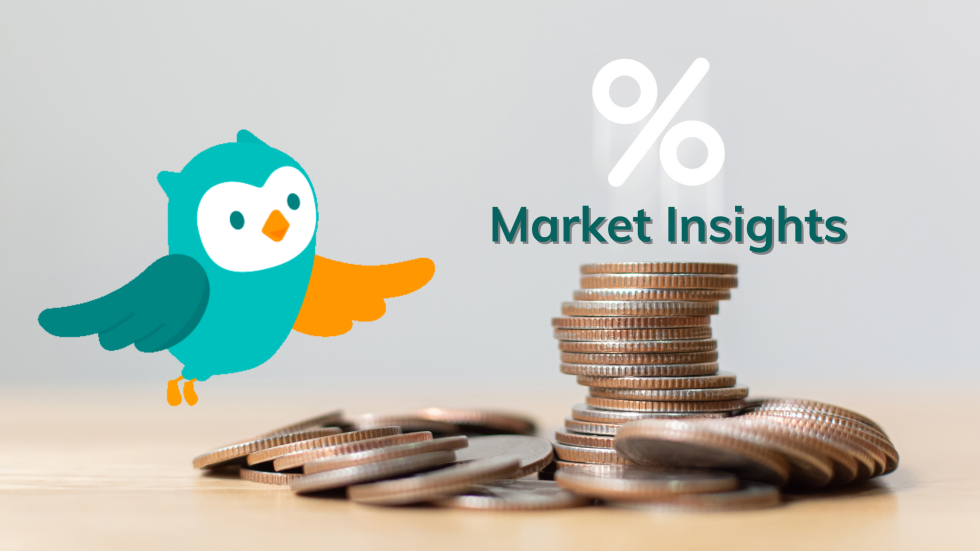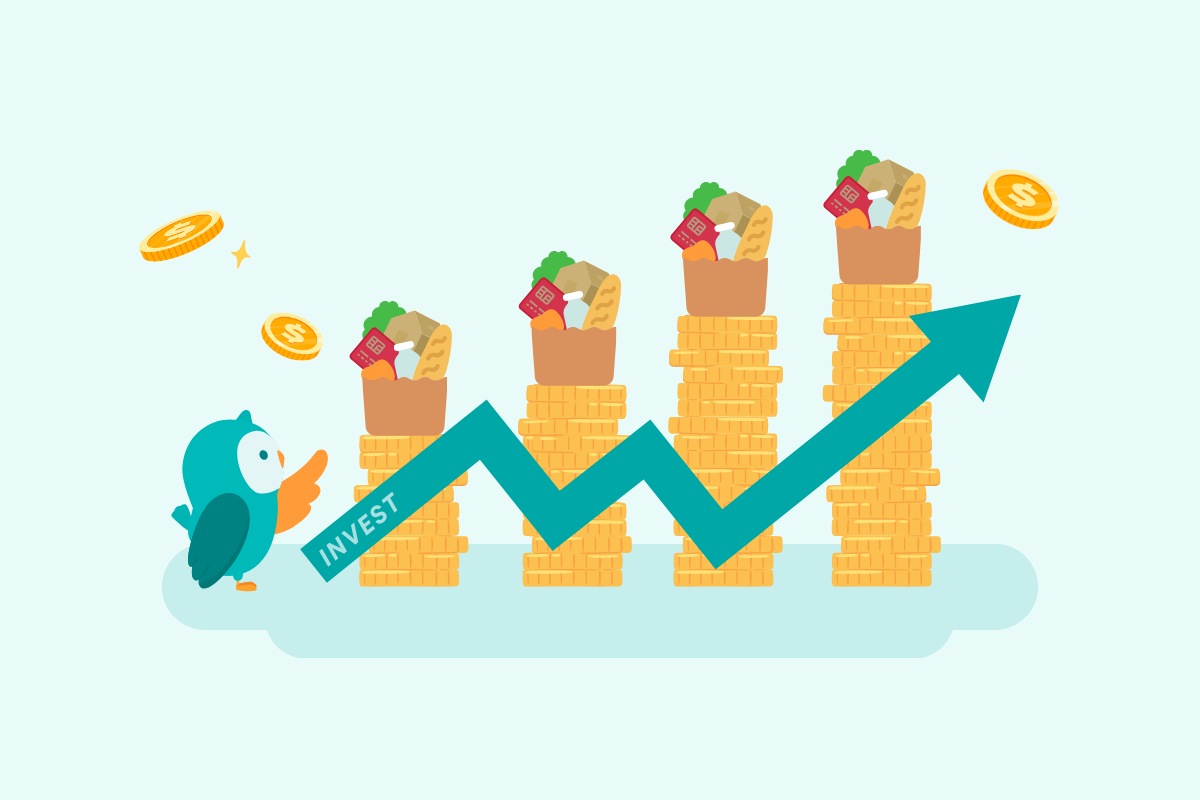Note: It was announced in November 2023 that MoneyOwl will be acquired by Temasek Trust to serve communities under a re-purposed model, and will move away from direct sale of financial products. The article is retained with original information relevant as at the date of the article only, and any mention of products or promotions is retained for reference purposes only.
______________
In this week’s market insights, our investment team shares why long-term investment market participation will bring about benefits.
(25 July 2022 – 29 July 2022)
Despite a busy week on the corporate earnings calendar, the second consecutive quarter of negative GDP growth, and a 75-bps rate hike by the Federal Reserve, equities continued to build on their bear market rally. The S&P 500 was up 4.28%, Global Equities (MSCI World Index) up 3.60% , while MoneyOwl’s 100% equity portfolio was up 3.27%. In Fixed Income, the Bloomberg Barclays Global Aggregate Index was down 6.81%.
It was an eventful week on the macroeconomic side, with most economic data from the US suggesting a softening of growth. Most notable would be negative GDP growth of -0.9% for the second quarter of 2022. This marks the second consecutive quarter of negative GDP growth. The debate on whether we are in the midst of a recession will continue, but without a doubt, growth is not looking exceptional right now.
The dilemma in equities right now should be explained in the right context, on one hand, we have just received another 75-bps interest rate hike by the Federal Reserve, inflation indicators are still elevated at high levels and recession indicators are flashing red. The only reason stocks rallied for the past month is the hope that recession is not coming anytime soon and the prospect that the Federal Reserve may have a monetary policy pivot soon.
As long-term investors, we are grateful that we do not need to predict what will happen in the markets. Having a view of the markets and adjusting your strategy based on that is essentially active management. In a year where markets are falling, some may wonder if active management would provide hope or relief in their portfolio performance. But the latest report by AJ Bell Manager versus Machine shows otherwise.
The proportion of active funds outperforming a passive alternative:

The report reveals that less than a third (30%) of active equity funds have outperformed a passive alternative so far this year. In the US (North America), only 40% of active equity funds outperform, with the recent technology sector sell-off being a big factor for underperformance.
Time and time again, evidence has shown that passive investing may have lower performance or less ‘glamour’ compared to active funds when they are performing well. But over the long term, the rewards to be reaped in passive investments are far greater than offered by any active investments.
For example, if you bought an ETF tracking the S&P 500 at its low in March 2020, you would have more than doubled your money by the beginning of 2022. That’s a high bar for any active manager to beat, especially since they tend to charge higher fees than low-cost ETFs. If passive investments are outperforming on the downside, that has a risk-management benefit to you as an investor and that shouldn’t be underappreciated. The disciplined process of keeping our investment philosophy/process ‘simple’ is the most attractive of all worlds.
Fed policy tightening and GDP Contracts
GDP contracted at -0.9% in the second quarter of 2022. This decline followed a contraction of -1.6% in the first quarter, fanning fears of a recession. Additionally, in continued efforts to dampen inflation, the US Federal Reserve enacted a 0.75 percentage point rate hike on Wednesday, taking its benchmark rate to a range of 2.25% to 2.50%. This is the Fed’s second consecutive 0.75 percentage point interest-rate hike. Chairman Jerome Powell dismissed speculation that the US economy is in recession. Stocks surged on his comments that hikes will eventually slow.
China’s Slowdown and Mortgage Crisis
China’s banks face mortgage losses of $350 billion in a worst-case scenario as confidence plunges in the nation’s property market and authorities struggle to contain deepening turmoil. A spiralling crisis of stalled projects has dented the confidence of hundreds of thousands of homebuyers, triggering a mortgage boycott across more than 90 cities. Meanwhile, China’s factory activity unexpectedly contracted in July, reversing earlier economic momentum as sporadic Covid-19 outbreaks weighed on the recovery, and real estate giant China Evergrande — the world’s most indebted developer — failed to deliver a “preliminary restructuring plan” it had promised by the end of July.
Upbeat earnings
Amazon.com and Apple are set to add almost $230 billion in market value Friday, soaring in pre-market trading after upbeat earnings buoyed risk sentiment — particularly for those worried about an economic slowdown. Amazon beat its sales forecast and said it’s starting to rein in hiring with a focus on cutting costs. Apple beat analysts’ revenue expectations thanks in part to higher iPhone sales at a time when global smartphone shipments are falling globally.
Face Time
US President Joe Biden and Chinese President Xi Jinping told aides to plan an in-person meeting during a 2-hour call Thursday, which would be the first face-to-face between the men since Biden became president. During the conversation, the leaders warned one another about the rising risks of a confrontation over Taiwan — Biden reiterated the US ‘One China’ policy but warned Xi against military action to reunify the mainland and the island. Xi told Biden that China will “resolutely safeguard China’s national sovereignty and territorial integrity” and that “whoever plays with fire will get burnt.” Tensions over Taiwan have been exacerbated by US House Speaker Nancy Pelosi’s plans to visit the island.
Singapore Savings Bonds record rate
The Monetary Authority of Singapore (MAS) has launched the August tranche of Singapore savings bonds (SSBs). The SSBs feature a step-up function, meaning that the interest increases over time — the longer you save, the higher your return. The August 2022 SSB will pay out a coupon rate of 2% per annum (p.a.) in year 1 and will eventually step up to 3.29% p.a. in year 10.
Demand was at an all-time high for this tranche. However, just $700 million was available under the August tranche, but the applications ended up more than triple that amount. Given that demand significantly exceeded supply, each application is only given a quantity ceiling at $9,000. Comparing to the July tranche, the quantity ceiling was set at $18,000.
Read more Market Insights here.
Disclaimer: While every reasonable care is taken to ensure the accuracy of information provided, no responsibility can be accepted for any loss or inconvenience caused by any error or omission. The information and opinions expressed herein are made in good faith and are based on sources believed to be reliable but no representation or warranty, express or implied, is made as to their accuracy, completeness or correctness. Expressions of opinions or estimates should neither be relied upon nor used in any way as an indication of the future performance of any financial products, as prices of assets and currencies may go down as well as up and past performance should not be taken as an indication of future performance. The author and publisher shall have no liability for any loss or expense whatsoever relating to investment decisions made by the reader.





